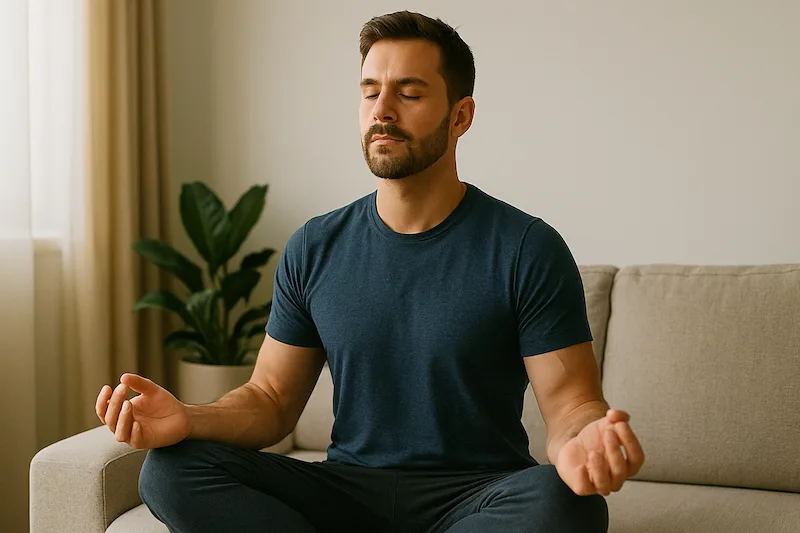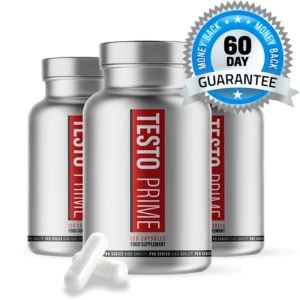Your libido is more than just a reflection of sexual desire—it’s a vital sign of your physical, emotional, and hormonal health. And one of the most silent killers of libido in men today is chronic stress.
When you’re under constant pressure—whether from work, relationships, or daily life—your body produces excessive cortisol. Over time, this disrupts testosterone levels, impairs blood flow, and suppresses the neurological pathways linked to arousal and desire. The result? A noticeable decline in sex drive, and often, your confidence too.
In our full breakdown on low libido in men, we covered all the potential causes of diminished sexual desire. But among them, stress is both one of the most common and most manageable—if you take the right steps.
This article will walk you through 7 natural, science-backed methods to reduce stress, reset your hormones, and rebuild your sex drive—without pills or prescriptions. Let’s get started.
How Stress Affects Male Libido
Stress isn’t just something you “feel” mentally—it creates a powerful hormonal chain reaction in your body that directly impacts sexual function. When stress becomes chronic, it activates your hypothalamic-pituitary-adrenal (HPA) axis, leading to prolonged cortisol production, the body’s main stress hormone.
Here’s how that disrupts your libido:
🔻 Cortisol Suppresses Testosterone
High cortisol levels signal the body to prioritize survival—not reproduction. This suppresses testosterone production, a hormone critical for sexual desire, erection quality, and sperm health.
🔻 Fight-or-Flight Kills Arousal
Chronic stress keeps your body in a sympathetic nervous system state—what’s known as “fight or flight.” This state diverts blood flow away from the genitals, making it difficult to feel aroused or stay erect.
🔻 Stress Wrecks Sleep and Recovery
Poor sleep is both a cause and consequence of stress. It reduces testosterone production, impairs recovery, and leaves you physically and mentally drained—further lowering sex drive.
🔻 Mental Stress = Performance Anxiety
Stress fuels self-doubt, rumination, and anxiety—especially during intimacy. This mental load disconnects you from pleasure and worsens symptoms of premature ejaculation or erectile dysfunction.
Bottom line: Chronic stress doesn’t just kill mood—it actively dismantles the biological systems responsible for arousal and sexual performance.
Now that you understand how stress disrupts your libido on a hormonal, physical, and mental level, the next question is: what can you do about it—naturally and effectively?
The good news is that you don’t need medication to start feeling like yourself again. By making small, intentional changes to your daily habits, you can lower cortisol, restore testosterone balance, and reactivate your sexual desire from the inside out.
1. Practice Deep Breathing and Diaphragmatic Control
One of the quickest and most effective ways to calm your nervous system—and revive your libido—is through deep, controlled breathing. Most men under stress breathe shallowly from their chest, which keeps the body in a state of tension and alertness. This type of breathing signals the brain to stay in “fight or flight” mode, suppressing sexual arousal.

✅ Why It Works
Diaphragmatic breathing (belly breathing) activates the parasympathetic nervous system—your body’s natural “rest and recover” mode. It lowers cortisol levels, relaxes blood vessels, improves circulation, and restores a state of calm necessary for arousal.
💡 How to Practice (4-7-8 Technique)
- Inhale through your nose for 4 seconds
- Hold your breath for 7 seconds
- Exhale slowly through your mouth for 8 seconds
- Repeat for 5–10 cycles, twice a day (morning + before sleep)
You can also try box breathing (4–4–4–4) or paced breathing using a mobile app like “Breathwrk” or “Calm.”
Benefits
- Reduces anxiety and mental noise during intimacy
- Helps prolong arousal by slowing down sympathetic response
- Improves sleep quality and recovery
2. Regular Physical Activity
When it comes to reducing stress and reigniting libido, exercise is one of the most powerful natural tools available. It improves hormone balance, increases blood flow, and boosts confidence—all of which directly support a healthy sex drive.
✅ Why It Works
- Lowers cortisol: Physical activity helps metabolize excess stress hormones, including cortisol.
- Boosts testosterone: Especially true for resistance training (like weightlifting), which is linked to natural testosterone production.
- Improves blood circulation: Better blood flow enhances arousal and erectile response.
- Elevates mood: Exercise releases endorphins and dopamine, lifting energy and libido naturally.
🏋️♂️ Best Types of Exercise for Libido
- Strength training (3–4x/week): Deadlifts, squats, bench press—all promote testosterone.
- Cardio (20–30 mins/day): Brisk walking, cycling, swimming, or light running.
- HIIT (2x/week): Short bursts of intense movement followed by rest—proven to improve hormonal response.
💡 Bonus Tip:
Exercise also improves body image and confidence, which are both deeply tied to sexual performance and desire. And if you combine regular training with a solid recovery routine (like deep sleep and clean nutrition), the results can be even more powerful.
3. Improve Sleep Quality
If you’re not sleeping well, your body is not recovering—and your libido is one of the first things to suffer. Poor sleep disrupts hormonal balance, elevates stress levels, and robs your body of the testosterone it needs for healthy sexual function.
✅ Why It Works
- Testosterone is produced during deep sleep. Just one week of sleeping less than 6 hours per night can significantly reduce testosterone levels in men.
- Lack of sleep = high cortisol. Sleep deprivation keeps cortisol levels elevated, worsening stress and further suppressing sexual desire.
- Good sleep boosts mood and energy, which are essential for a healthy sex life.
😴 Tips to Improve Sleep Naturally
- Stick to a consistent sleep schedule. Go to bed and wake up at the same time—even on weekends.
- Limit screen time 1–2 hours before bed. Blue light suppresses melatonin, your sleep hormone.
- Cool, dark, quiet room. Ideal temperature: ~18°C (65°F). Use blackout curtains or a sleep mask.
- Wind down with a calming routine. Deep breathing, light stretching, or reading can signal your brain it’s time to rest.
If lifestyle changes alone aren’t enough, you can also consider supplementing with natural ingredients known to support testosterone and sleep—many of which are included in the best male enhancement pills that support libido from multiple angles.
4. Mindfulness and Meditation
In a world of constant distractions and mental overload, mindfulness is a powerful tool for resetting both your stress response and your sexual awareness. When practiced regularly, it helps you stay present, reduce anxiety, and reconnect with your body—three things that are crucial for a healthy libido.

✅ Why It Works
- Reduces cortisol and calms the nervous system. Mindfulness activates the parasympathetic nervous system, shifting your body out of “fight or flight.”
- Improves sexual awareness and arousal control. By staying present during intimacy, you can delay ejaculation and increase satisfaction.
- Helps break the cycle of performance anxiety. It allows you to step out of your head and into your senses.
🧘♂️ Simple Practices to Start With
- Basic breathing meditation: Sit quietly and focus on your breath for 5–10 minutes. When your mind wanders, gently return to the breath.
- Body scan: Slowly bring awareness to each part of your body, from your toes to the top of your head. Great before bed.
- Guided meditations: Use apps like Headspace, Calm, or Insight Timer for structured sessions focused on stress or sleep.
💡 Tip for Better Results:
Combine mindfulness with techniques like deep breathing and Kegel exercises. This mind-body connection is key for overcoming psychological blocks to arousal and desire.
5. Connect Emotionally With Your Partner
Sexual desire isn’t just about physical attraction or hormone levels—it’s also deeply rooted in emotional connection. When you feel disconnected, misunderstood, or emotionally distant from your partner, libido tends to drop. Chronic stress only amplifies this distance.
✅ Why It Works
- Emotional intimacy reduces stress. Open communication and shared vulnerability activate oxytocin, the “bonding hormone,” which calms the nervous system.
- Improves trust and safety. When partners feel emotionally secure, they’re more likely to enjoy physical intimacy without performance anxiety.
- Deepens physical pleasure. Emotional connection allows for more presence, touch, and responsiveness—amplifying satisfaction on both sides.
💬 Simple Ways to Reconnect
- Have intentional conversations outside of the bedroom. Ask how your partner’s really feeling—not just how their day was.
- Express affection physically without expecting sex—like hugs, back rubs, or cuddling.
- Practice eye contact and non-verbal communication during intimacy—it builds trust and presence.
💡 Real Talk:
Sometimes, libido isn’t “low”—it’s buried under unspoken tension, unhealed conflicts, or emotional distance. Addressing this can reignite attraction and unlock a deeper level of desire.
6. Eat Stress-Reducing, Libido-Friendly Foods
You are what you eat—and when it comes to stress and libido, your diet can make or break your hormonal balance. Certain foods are rich in nutrients that support testosterone production, improve blood flow, and calm the nervous system—all crucial for restoring a healthy sex drive.

✅ Why It Works
- Reduces inflammation and cortisol: Whole, nutrient-dense foods help regulate stress hormones.
- Supports testosterone and libido: Key vitamins and minerals (like zinc, magnesium, and B-complex) are essential for hormone health.
- Improves circulation: Foods high in healthy fats and antioxidants support vascular function, enhancing arousal and erectile response.
🥑 Top Libido-Friendly Foods to Include
- Avocados: Rich in vitamin B6, folate, and healthy fats that support hormone production.
- Dark chocolate (70%+): Boosts dopamine and contains antioxidants that reduce stress.
- Salmon & fatty fish: High in omega-3s to lower cortisol and support circulation.
- Pumpkin seeds & walnuts: Great sources of zinc and magnesium—key minerals for libido and testosterone.
- Leafy greens (like spinach): Rich in folate and nitrates that enhance blood flow.
🚫 Foods to Limit
- Processed carbs and sugar (spike cortisol, crash testosterone)
- Excess alcohol (depresses the nervous system)
- Caffeine overload (can trigger anxiety and sleep issues)
💡 Tip:
Try building meals around these foods for at least 2–3 weeks. You might start noticing subtle shifts in mood, energy, and sexual desire—especially when paired with the other techniques in this guide.
7. Limit Porn and Masturbation Habits
While masturbation and porn aren’t inherently harmful, excessive or compulsive use—especially during times of high stress—can desensitize your brain’s reward system and weaken your natural libido. Over time, this can lead to lower arousal during real-life intimacy and a decreased ability to maintain interest with a partner.
✅ Why It Works
- Prevents dopamine burnout: Constant artificial stimulation from porn floods your brain with dopamine, eventually dulling its sensitivity.
- Restores natural arousal patterns: Taking a break allows your brain to “reset” and become more responsive to real-life touch and intimacy.
- Improves erection quality and mental focus: Many men report stronger erections and better emotional presence after reducing or quitting porn.
🔁 Reset Strategies
- Try a 7–14 day “dopamine reset”: No porn or masturbation during this time. Focus on other pleasure sources (music, movement, connection).
- Track your urges: Use a journal or habit tracker to increase self-awareness.
- Replace the habit with something mindful: Deep breathing, walking, or cold showers can interrupt automatic behaviors.
💡 Important:
The goal isn’t abstinence forever—it’s balance. Once you restore sensitivity and emotional engagement, you’ll likely find your desire and performance improve naturally.
The truth is, not every case of low libido can be fixed with lifestyle changes alone. While the techniques above work wonders for most men, there are times when deeper imbalances—whether hormonal, emotional, or psychological—require more than self-care.
That’s when professional support can make all the difference.
When to Seek Professional Help
While lifestyle changes like the ones we’ve covered can dramatically improve your libido and lower stress levels, there are times when deeper support is needed.
If you’ve tried several of these strategies consistently over a few months and still struggle with low libido, erectile issues, or persistent anxiety, it may be time to consult a professional.

👨⚕️ You should consider seeing a doctor or therapist if:
- Your lack of desire lasts longer than 6 months
- You experience severe performance anxiety or panic during intimacy
- You suspect low testosterone or other hormonal imbalances
- Your relationship is being affected by communication breakdowns or emotional disconnect
A healthcare provider can help rule out underlying issues like hormonal disorders, depression, or medications that may be affecting your sexual health. A qualified sex therapist can also help you work through psychological blocks and rebuild confidence in a safe, guided way.
Frequently Asked Questions (FAQs)
1. How exactly does stress lower libido in men?
Chronic stress elevates cortisol, which suppresses testosterone production and disrupts blood flow and neurological signals needed for arousal. It also increases mental distractions and anxiety, further lowering desire.
2. How long does it take to see improvements after changing habits?
Most men notice early improvements in mood, sleep, and energy within 1–2 weeks. Libido and erection quality may improve after 3–6 weeks of consistent changes like sleep, exercise, and stress reduction.
3. Can supplements help speed up recovery?
Yes—some natural supplements support testosterone, blood flow, and stress relief. These are often included in high-quality male enhancement formulas and can complement lifestyle changes effectively.
4. How do I know if my low libido is from stress or something more serious?
If it improves when you’re relaxed, rested, and connected to your partner, stress is likely the cause. But if symptoms persist beyond 6 months, it’s best to speak with a doctor to rule out hormonal, neurological, or psychological issues.
Conclusion
Stress is a silent saboteur of male libido—but it’s also one of the most reversible. By taking small, consistent steps to manage your stress, improve sleep, fuel your body, and reconnect with yourself and your partner, you can rebuild your sex drive from the inside out.
You don’t need a prescription to reclaim your desire. You just need the right tools—and the commitment to use them daily.
Start with one change today. Breathe deeper. Sleep earlier. Move more. These little habits compound over time—and before you know it, you’ll feel more energized, confident, and fully present in your intimate life again.





